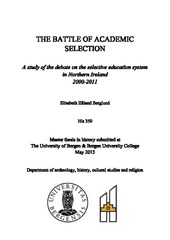The battle of academic selection. A study of the debate on the selective education system in Northern Ireland 2000-2011.
Master thesis
Permanent lenke
https://hdl.handle.net/1956/6965Utgivelsesdato
2013-05-14Metadata
Vis full innførselSammendrag
In this thesis I have studied the process of the debate on the selective education system in Northern Ireland, from 2000 to 2011. Since it was introduced in 1947, the education system in Northern Ireland had been based on academic selection. This meant that the transfer from primary to post-primary schools, was based on the pupils' performance in the 11-plus, which was an examination in numeracy and literacy. Those who performed well were selected to go to Grammar schools, and those who did not, went to Secondary schools. In the years following the signing of the Belfast Agreement in 1998, academic selection was one of the most debated issues on the political agenda in Northern Ireland. Central to the debate was the political parties' views on academic selection, how they argued, what kind of strategies they followed, as well as the political cleavages that emerged as the debate developed. This debate happened in a highly politically unstable period. The Belfast Agreement in 1998 was a milestone in the peace process, and it was also seen as a historical compromise that would enable and encourage the community in Northern Ireland to work together. However, the many years of conflict still strongly influenced the relationships between the political parties throughout the first decade after the agreement. Due to disagreements between the parties in Northern Ireland, the Northern Ireland Assembly and the Executive was suspended on several occasions, thus also moving the debate to Westminster. In turn, the political situation heavily influenced the development of the debate on the selective education system. Therefore, the study of this debate also provides a deeper insight into the workings and dynamics of the new Northern Irish governmental framework in a formative period.
